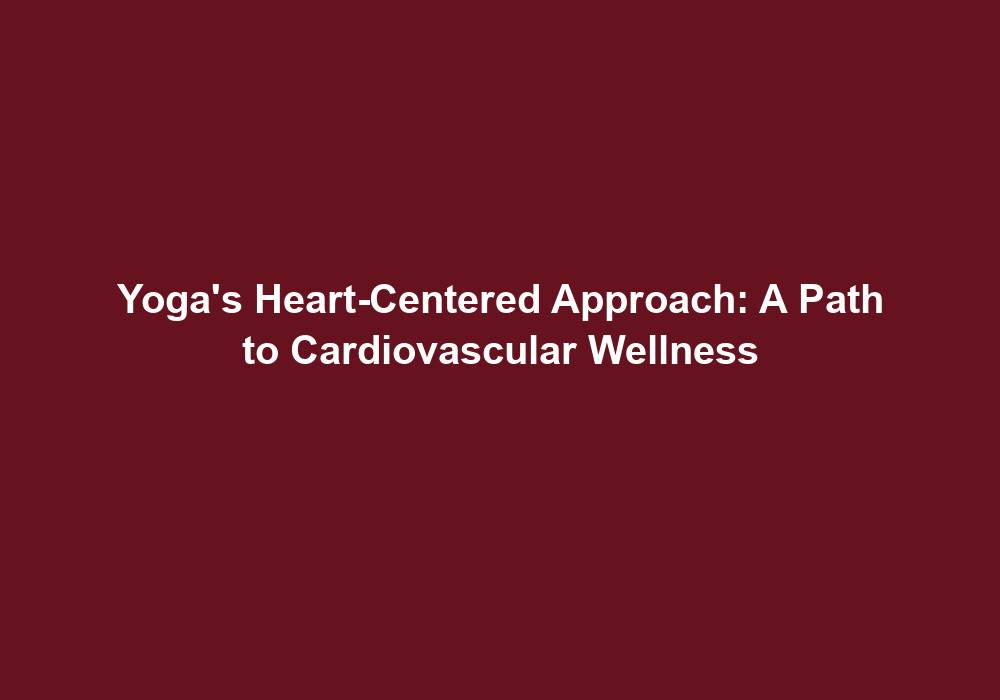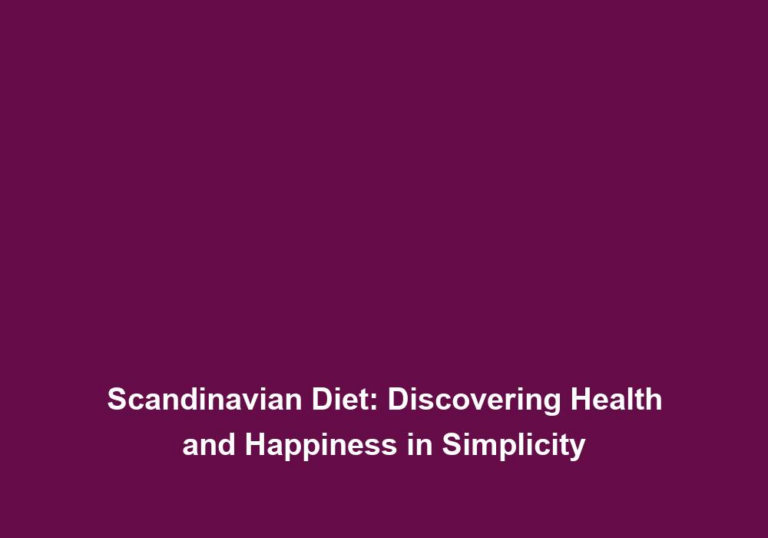Yoga’s Heart-Centered Approach: A Path to Cardiovascular Wellness
Yoga, an ancient practice originating in India, has gained immense popularity worldwide for its holistic approach to health and well-being. While often associated with flexibility and stress reduction, yoga also offers numerous benefits for cardiovascular wellness. Through its heart-centered approach, yoga provides a comprehensive path towards maintaining a healthy heart and enhancing overall cardiovascular fitness.
Understanding Yoga’s Heart-Centered Approach
Yoga’s heart-centered approach emphasizes the connection between the mind, body, and heart. It recognizes the vital role of the heart as not only a physical organ but also as the center of our emotions and spiritual well-being. By cultivating awareness, mindfulness, and self-compassion, yoga helps individuals develop a deeper understanding of their heart and its role in maintaining overall health.
The Physical Benefits of Yoga for the Heart
-
Improved Circulation: The various asanas (postures) and pranayama (breathing exercises) involved in yoga promote blood flow throughout the body, including the heart. This increased circulation helps deliver oxygen and nutrients to the heart muscle, supporting its optimal functioning.
- Asanas, such as forward bends and inversions, help facilitate blood flow towards the heart, improving circulation and preventing the accumulation of plaque in the arteries.
- Pranayama techniques, like deep breathing exercises, help expand lung capacity, increasing the oxygen supply to the heart and reducing the workload on the cardiovascular system.
-
Reduced Blood Pressure: Studies have shown that regular yoga practice can help lower blood pressure levels, reducing the risk of hypertension and related cardiovascular diseases. The combination of gentle movements, deep breathing, and relaxation techniques in yoga contributes to a calmer nervous system and lower stress hormone levels, leading to decreased blood pressure.
- The slow, controlled movements in yoga, combined with conscious breathing, activate the parasympathetic nervous system, promoting a state of relaxation and reducing stress.
- Yoga also helps release tension in the muscles, relieving strain on the blood vessels and promoting healthy blood pressure levels.
-
Enhanced Cardiovascular Fitness: Yoga offers a unique blend of strength, flexibility, and balance training, which can improve overall cardiovascular fitness. Dynamic yoga sequences, such as Vinyasa or Power Yoga, elevate the heart rate and challenge the cardiovascular system, helping to strengthen the heart muscle and improve endurance.
- Vinyasa and Power Yoga involve continuous movement and flowing sequences, elevating the heart rate and increasing cardiovascular endurance.
- Holding yoga poses, such as Warrior or Chair Pose, engages and strengthens the major muscle groups, including the heart, improving its efficiency and overall cardiovascular fitness.
The Emotional and Mental Benefits of Yoga for the Heart
-
Stress Reduction: Chronic stress is a significant risk factor for heart disease. Yoga’s emphasis on mindfulness and deep breathing activates the body’s relaxation response, reducing stress levels and promoting a sense of calm. By managing stress, yoga helps protect the heart from adverse effects and enhances overall emotional well-being.
- Mindful awareness in yoga cultivates a present-moment focus, allowing individuals to let go of stressors and worries, promoting relaxation and reducing the impact of chronic stress on the heart.
- Deep breathing techniques, such as diaphragmatic breathing, activate the relaxation response, reducing heart rate and blood pressure, and promoting a state of calm.
-
Emotional Balance: Yoga encourages individuals to connect with their emotions and cultivate self-compassion. By acknowledging and processing emotions, yoga practitioners develop emotional resilience and reduce the risk of emotional distress, which can contribute to heart-related problems.
- Yoga provides a safe and non-judgmental space for individuals to explore and express their emotions, allowing for emotional release and healing.
- Regular yoga practice fosters self-awareness and self-compassion, enabling individuals to navigate their emotions with greater ease and reduce the negative impact of emotional stress on the heart.
-
Mind-Body Connection: Yoga’s mind-body integration strengthens the connection between the brain and the heart. Through practices like meditation and visualization, individuals can tap into their inner wisdom and intuition, fostering a deeper understanding of their heart’s needs and desires. This connection promotes a harmonious balance between the physical, emotional, and spiritual aspects of our being.
- Meditation practices in yoga, such as loving-kindness meditation or heart-centered meditation, cultivate a sense of connection to the heart and deepen the understanding of its role in overall well-being.
- Visualization techniques, like imagining the heart as a radiant light or sending positive intentions to the heart, enhance the mind-body connection and promote a sense of harmony and coherence.
Incorporating Yoga into a Heart-Healthy Lifestyle
To benefit from yoga’s heart-centered approach, it is essential to incorporate regular yoga practice into a heart-healthy lifestyle. Here are some practical tips to get started:
-
Consult with a Healthcare Professional: Before beginning any new exercise program, especially if you have pre-existing heart conditions, it is crucial to consult with a healthcare professional. They can provide personalized guidance and ensure that yoga is suitable for your specific needs.
- A healthcare professional can assess your cardiovascular health and provide recommendations on modifications or precautions to take during yoga practice.
- They can also help tailor a yoga practice that aligns with your fitness level and any physical limitations or concerns.
-
Choose the Right Style of Yoga: There are various styles of yoga, each offering unique benefits. For cardiovascular health, dynamic styles like Vinyasa, Power Yoga, or Ashtanga can be particularly beneficial. However, it is essential to start with beginner-level classes and gradually increase the intensity as you build strength and stamina.
- Dynamic styles of yoga involve continuous movement, flowing sequences, and challenging poses, which elevate the heart rate and improve cardiovascular endurance.
- Starting with beginner-level classes allows for a gradual progression and ensures proper alignment and technique, reducing the risk of injury.
-
Practice Regularly: Consistency is key when it comes to reaping the benefits of yoga. Aim for at least three to five sessions per week, focusing on both physical postures and breathing exercises. However, listen to your body’s needs and adapt the frequency and intensity accordingly.
- Regular practice allows the body to adapt and progress in flexibility, strength, and cardiovascular fitness.
- It is important to listen to your body’s signals and adjust the intensity or take rest days as needed to prevent overexertion or strain.
-
Combine Yoga with Other Cardiovascular Activities: While yoga offers numerous benefits for heart health, it is also beneficial to incorporate other forms of cardiovascular exercise, such as brisk walking, swimming, or cycling, into your routine. This combination ensures a comprehensive approach to cardiovascular wellness.
- Engaging in a variety of cardiovascular activities helps target different muscle groups and enhances overall cardiovascular fitness.
- Incorporating activities like brisk walking or cycling can provide additional aerobic benefits and complement the strength, flexibility, and balance training of yoga.
-
Maintain a Heart-Healthy Diet: Alongside yoga practice, adopting a heart-healthy diet rich in fruits, vegetables, whole grains, lean proteins, and healthy fats is essential. A well-balanced diet supports overall cardiovascular health and complements the benefits of yoga.
- Consuming nutrient-dense foods, such as leafy greens, berries, and fatty fish, provides essential vitamins, minerals, and antioxidants that promote heart health.
- Avoiding or minimizing processed foods, sugary beverages, and excessive sodium intake helps reduce the risk of cardiovascular diseases.
Conclusion
Yoga’s heart-centered approach provides a powerful path towards cardiovascular wellness. By focusing on the connection between the mind, body, and heart, yoga offers numerous physical, emotional, and mental benefits that support optimal heart health. Incorporating regular yoga practice, along with a heart-healthy lifestyle, can help individuals enhance their overall well-being and cultivate a harmonious balance between their heart and their entire being. Embrace yoga’s heart-centered approach and embark on a journey towards cardiovascular wellness today.







